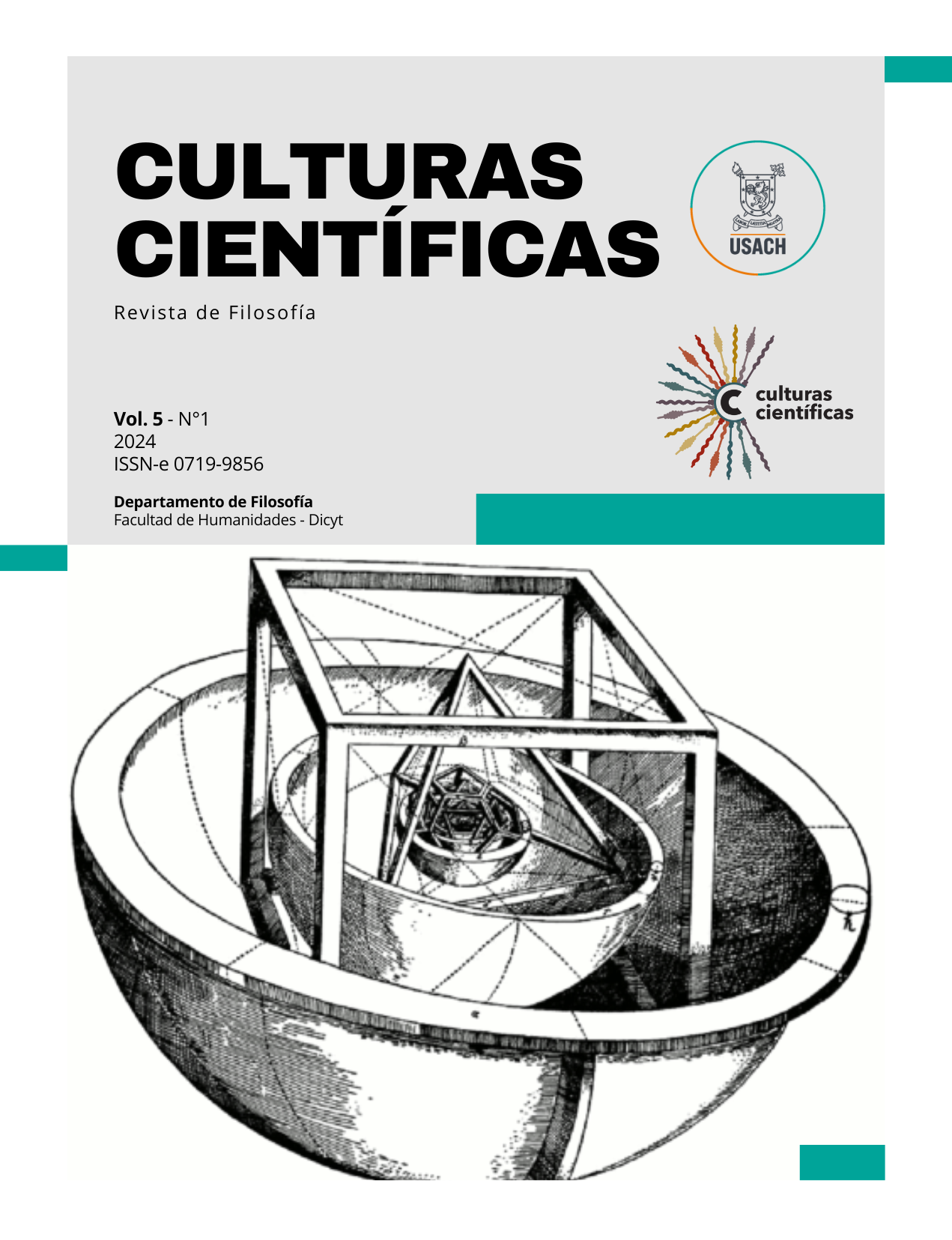Extra Epistemic Values in the Sciences. Is it possible to sustain the ideal of value-free science today?
DOI:
https://doi.org/10.35588/cc.v5i1.6410Keywords:
extra epistemic values, scientific pluralism, ideal of value-free science, inductive risk, inductive gapAbstract
This work addresses the ideal of science free of extra epistemic values. In this regard, the discussion is situated within the framework of authors who subscribe to the so-called scientific pluralism, who, in general, have a position more inclined to accept the influence of extra-epistemic values in the sciences, such as moral, political and social values. In particular, the positions of Helen Lóngino, Heather Douglas and John Dupré are reviewed, analyzing whether or not the criticisms developed mainly by Hugh Lacey are applicable, who, being a pluralist, continues to support the ideal of value-free science. It is concluded that there are good arguments that support the influence of extra epistemic values in the sciences; However, its extension may be subject to debate or nuanced. In this regard, a position is taken based on the position of John Dupré, which recognizes that in certain areas of science- such as particle physics- there is no extra epistemic burden. Likewise, it is concluded that, although the ideal of a completely value-free science must be rejected, its dimension as a regulative ideal may have some relevance, imposing a greater challenge for positions that seek to refute the ideal in question.
Downloads
References
Ayer, A. J. (1936/1971). Language, truth and logic. London: Penguin.
Anderson, E. (1995). Feminist Epistemology: And Interpretation and a Defense. Hypatia, Summer, 1995, Vol. 10, No. 3, Analytic Feminism (Summer, 1995); pp. 50-84. https://doi.org/10.1111/j.1527-2001.1995.tb00737.x
Aldunate, M. (2021). Informe técnico: seguridad de la vacuna sars-cov-2 Coronoavac e hidróxido de aluminio en personas menores de 18 años. Santiago: Instituto de Salud Pública, Ministerio de Salud, Gobierno de Chile. Disponible en línea: https://www.ispch.cl/wp-content/uploads/2021/09/INFORME-T%C3%89CNICO-SEGURIDAD-DE-LA-VACUNA-SARS-COV-2-CORONAVAC-E-HIDR%C3%93XIDO-DE-ALUMINIO-EN-PERSONAS-MENORES-DE-18-A%C3%91OS.pdf [Consultado con fecha 20-12-2024]
Bacon, F. (1620/2003). The New Organon. Cambridge University Press.
Betz, G. (2017): Why the Argument from Inductive Risk Doesn’t Justify Incorporating Non-Epistemic Values in Scientific Reasoning. En En Elliot, Kevin C.; Steel, Daniel (ed.): Current Controversies in Values and Science. Routledge, pp. 64-78. https://doi.org/10.4324/9781315639420
Brown, Matthew J. (2017). Against Epistemic Priority. En Elliot, Kevin C.; Steel, Daniel (ed.): Current Controversies in Values and Science. Routledge, pp. 64-78. https://doi.org/10.4324/9781315639420
Chang, Hasok (2012). Is Water H20? Evidence, Realism and Pluralism. Springer.
Chang, Hasok (2022). REALISM FOR REALISTIC PEOPLE. A New Pragmatist Philosophy of Science. Cambridge University Press. https://doi.org/10.1017/9781108635738
Douglas, H. (2009). Science, policy, and the value-free ideal. University of Pittsburgh Press. https://doi.org/10.2307/j.ctt6wrc78
Dupré, J. (1993). The Disorder of Things. Metaphysical Foundations of the Disunity of Science. Harvard University Press.
Feyerabend, P. (1975). Against method: Outline of an anarchistic theory of knowledge. Verso Books.
Gómez, Ricardo J (2014). La dimensión valorativa de las ciencias: hacia una filosofía política. Universidad Nacional de Quilmes.
Galilei, G. (1623/1957). Galilei, G. (1957). Discoveries and opinions of Galileo: Including The starry messenger (1610), Letter to the Grand Duchess Christina (1615), and excerpts from Letters on sunspots (1613), The assayer (1623) (S. Drake, Trad. y Ed.). Anchor Books.
Hume, D. (1740/1984). Tratado de la naturaleza humana. Ediciones Orbis.
Kincaid, Harold; Dupré, John & Wylie, Alison (Eds.) (2007). Value-Free Science? Ideals and Illusions. Oxford University Press. https://doi.org/10.1093/acprof:oso/9780195308969.001.0001
Kellert, S.; Longino, H; and Waters, K. (ed.) (2006). Scientific Pluralism. University of Minnesota Press.
Kitcher, P. (2001). Science, Truth, and Democracy. Oxford University Press. https://doi.org/10.1093/0195145836.001.0001
Longino, H. (1990). Science as Social Knowledge. Princeton University Press. https://doi.org/10.2307/j.ctvx5wbfz
Lacey, H. (2017). Distinguishing Between Cognitive and Social Values. En Elliot, Kevin C.; Steel, Daniel (ed.): Current Controversies in Values and Science. Routledge, pp. 64-78. https://doi.org/10.4324/9781315639420
Lacey, H. (1999). Is science value free? Values and scientific understanding. Routledge.
Lacey, H. (2005). Values and Objectivity in Science: The Current Controversy about Transgenic Crops. Lexington Books.
Olivares Díaz, Paulo (2023). Conclusiones Indeseables en las Ciencias: Una Perspectiva Pluralista. En Revista Culturas Científicas. Vol.4, N°1, Pág. 18-34. https://doi.org/10.35588/cc.v4i1.5995
Putnam, H. (1975). Mathematics, Matter and Method: Philosophical Papers, Volume 1. https://doi.org/10.1086/288790
Putnam, H. (2002). The collapse of value/fact dichotomy and other essays. Harvard University Press.
Popper, K. R. (1934/1980). La lógica de la investigación científica. Editorial Tecnos.
Poincaré, H. (1920/1958). The Value of Science. Dover.
Quine, W.V. (1951). Two Dogmas of Empiricism. En The Philosophical Review, Vol. 60, No. 1. (Jan., 1951), pp. 20-43.
Sharlin, A. N. (1974). “Max Weber and the origins of the Idea of Value-Free Social Science”. En European Journal of Sociology / Archives Européennes de Sociologie / Europäisches Archiv für Soziologie, 1974, Vol. 15, No. 2, Citoyens armés, prétoriens désarmés (1974), pp. 337-353.
Kuhn, T. S. (1962). The structure of scientific revolutions. University of Chicago Press.
Reichenbach, H. (1938). Experience and prediction: An analysis of the foundations and the structure of knowledge. University of Chicago Press. https://doi.org/10.1037/11656-000
Rooney, P. (2017): “The Borderlands Between Epistemic and Non-Epistemic Values”. En Elliot, Kevin C.; and Steel, Daniel (ed.), Current Controversies in Values and Science. Routledge, pp. 31-45. https://doi.org/10.4324/9781315639420
Thonemann, Philip (2020). Ideally Value-Free Coronavirus Science. Disponible en línea https://www.lse.ac.uk/philosophy/blog/2020/09/09/ideally-value-free-coronavirus-science/ [Consultado con fecha 20-12-2024]
Weber, M. (1913/1999). “Value-judgments in Social Science”. En Boyd, Richard; Gasper, Philip; and Trout, J.D. (ed.), The Philosophy of Science. Séptima edición. The MIT Press.
Downloads
Submitted
2023-10-24Published
Versions
- 2025-01-17 (2)
- 2024-12-26 (1)
Issue
Section
License
Copyright (c) 2024 Paulo Javier Olivares Díaz

This work is licensed under a Creative Commons Attribution 4.0 International License.











